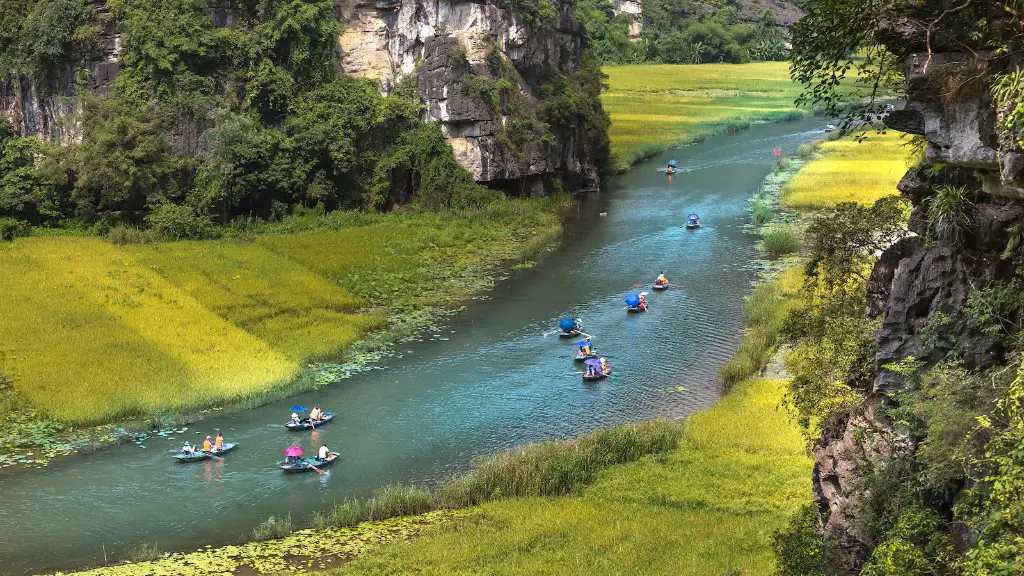The Yellow River, or Huang He, is one of China’s most important rivers. It not only provides water for agricultural and industrial use, but also played a significant role in the country’s history and culture. For centuries, the river was known as the ” cradle of Chinese civilization ” due to the many important settlements that sprang up along its banks. Today, the river is still an important part of Chinese life, providing water for over 500 million people. While the Yellow River has brought great benefits to the Chinese people, it has also caused devastating floods that have claimed millions of lives. In recent years, the Chinese government has taken steps to try and control the river’s floodwaters, but the threat of flooding remains a very real concern for those who live along its banks.
The Yellow River plays a significant role in the lives of Chinese people. The river is the third-longest in Asia and the sixth-longest in the world. It is the birthplace of Chinese civilization and has been an important trade and transportation route for centuries. The river has also been a source of water for irrigation and hydropower. In recent years, the river has been plagued by pollution and sedimentation.
How does the Yellow River affect people?
The river basin is an important water resource for the people living there. They depend on it for their livelihoods, including for food production, hydropower, industry, and domestic supply. In recent years, the river’s flow has greatly diminished, affecting the lives of millions. This is a serious problem that needs to be addressed.
The worst flood in human history occurred in 1887, when the Yellow River overran the dikes in Henan Province. That flood covered 50,000 square miles. It inundated eleven large towns and hundreds of villages. Nine hundred thousand people died, and two million were left homeless.
Why is the Yellow River important in Chinese civilization
The Yellow River is an important symbol in Chinese culture. It is known as “the Mother River” and “the Cradle of Chinese Civilization” because it was the birthplace of ancient Chinese civilizations in the Xia (2100–1600 BC) and Shang (1600–1046 BC) eras – the most prosperous region in early Chinese history. The Yellow River is a source of great pride for the Chinese people and is an important part of Chinese culture and identity.
The two most important geographical features of Ancient China were the two major rivers that flowed through central China; the Yellow River to the north and the Yangtze River to the south. These major rivers were a great source of freshwater, food, fertile soil, irrigation and transportation. They allowed the Ancient Chinese to develop a complex agricultural society and to establish a strong centralized government.
How does the river affect people’s lives?
Rivers provide many benefits to humans and the environment. They supply fresh water for drinking and irrigation, transport for goods and people, and habitat for fish and other wildlife.
Rivers also play an important role in the water cycle, releasing water vapor into the atmosphere and replenishing groundwater supplies.
Because of the many benefits they provide, it is important to protect and manage our rivers responsibly.
The 1887 flood of the Huang-Ho (Yellow River) was one of the most severe floods in Chinese history. Heavy rainfall unleashed an enormous flood wave, which swelled further as dams burst, inundating more than 15,000 square kilometers. This flood caused immense damage and loss of life, with some estimates suggesting that as many as two million people may have died.
What are the issues with the Yellow River in China?
The Yellow River is one of the most important rivers in China, but its potential has been stunted due to unsustainable use of water, soil erosion, sediment and pollution. These problems have caused serious environmental and economic problems in the river’s basin, and have prevented the river from reaching its full potential.
TheYellow River was a threat to the Chinese because it often flooded settlements in northern China. The river provided the water needed for successful wheat and millet farming, but the river also silted up and, as a result, often overflowed its banks.
Who did the Yellow River flood affect
This is a tragic event that happened during WWII. Thousands of villages were flooded and several million people were displaced. The death toll is unknown, but it is estimated that it could be as high as 800,000. This is a huge loss of life and it is heart-wrenching to think about.
Flooding was a major problem in ancient China, particularly in the Huang He (Yellow River) valley. With the development of dykes and other flood control measures, however, the Chinese were able to better control the river and save their crops from flooding. This allowed Chinese leaders to solidify their rule of China, and a number of dynasties headquartered in the region followed. The valley became the center of Chinese culture, society, and learning.
Why was the river important to China?
The Yangtze River is one of the most important rivers in China, serving as a vital waterway for transportation, irrigation, and hydropower. The river basin is home to over one-third of China’s population and contributes to over 40% of the country’s GDP. Despite its importance, the Yangtze River is facing a number of serious environmental problems, including pollution, over-development, and climate change. In order to protect this vital resource, it is important for the Chinese government to take action to mitigate these threats.
These two rivers are important to China for several reasons. First, they provide water for irrigation, which is necessary for growing crops. Second, they are used for transportation, both for goods and for people. And third, they are a source of hydroelectric power.
What river was most important to China
The Yangtze is the most important river in China and is the country’s principal waterway. The basin of the Yangtze River contains nearly one-third of China’s population and is the country’s great granary. The Yangtze is an important transport route for goods and passengers and is also a source of hydroelectric power.
The breach of the dyke was an attempt at strategic interdiction, to limit the mobility of the Japanese army and stop it moving further west. The waters of the River were to do what soldiers had not been able to do: to halt the Japanese advance. The breaching was a strategic move born of desperation.
How does river pollution affect people?
It is estimated that more than 50 kinds of diseases are caused by poor drinking water quality, and that up to 80% of all diseases and 50% of child deaths in the world are related to poor water quality. Some of the diseases caused by water pollution include diarrhea, skin diseases, malnutrition, and even cancer. This highlights the importance of access to clean, safe water in order to protect public health.
Natural disasters can have a devastating impact on communities. loss of human life, damage to property and infrastructure, and road closures are just some of the risks that communities face. While there is no way to completely prevent these disasters from occurring, there are ways to reduce the risks. One way is to have a robust emergency response plan in place. This plan should include things like evacuation routes and designated shelters. Another way to reduce risk is to make sure that buildings and infrastructure are built to withstand the worst that a natural disaster can throw at them. This means making sure that buildings are up to code and that they are constructed using the best materials possible. Finally, it is important to have contingency plans in place in case a natural disaster does occur. This could include having a backup power source or alternate means of transportation. By taking these steps, communities can reduce the risks posed by natural disasters.
Warp Up
The Yellow River is one of China’s great rivers and has had a profound impact on the lives of the Chinese people for centuries. The river is a major source of water for irrigation and transportation, and has also played an important role in the country’s economic and cultural development. The Yellow River has been a major contributor to China’s agricultural and economic prosperity, and has helped to shape the country’s history and culture.
The Yellow River is one of the most important rivers in China, and it has had a profound impact on the lives of the Chinese people. The river has provided a means of transportation, irrigation, and power for the Chinese people for centuries. It has also been a source of food and drinking water. The river has played a major role in the economic development of China.





